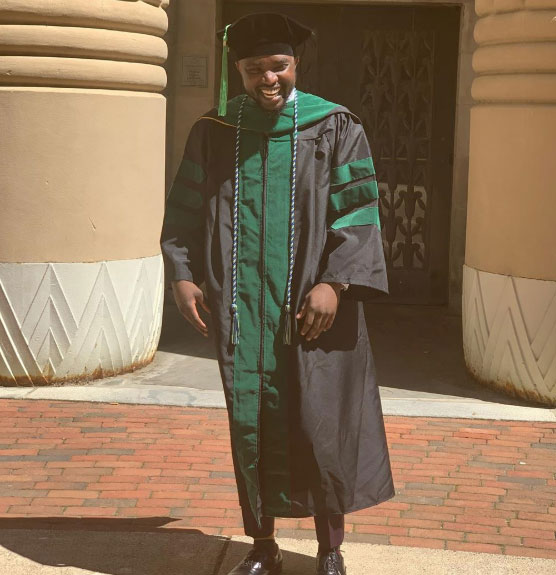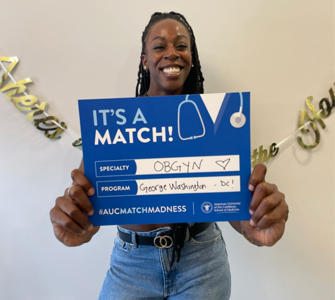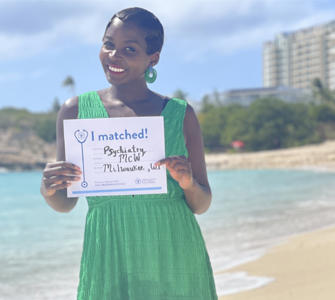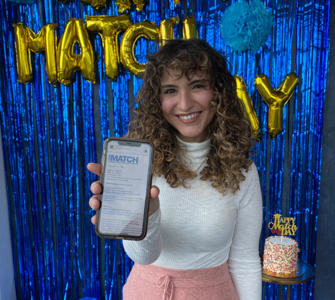“I remember texting my girlfriend, ‘I think I’ve fallen in love with a new specialty,’” says Dr. Akadiri, a Class of 2020 AUC graduate.
Now, Dr. Akadiri has the opportunity to build that passion into a career after earning an anesthesiology residency at the University of Central Florida / Ocala Health.
“I had a great connection with this program,” Dr. Akadiri says. “In my interview, I could tell that the program director and staff truly cared about the residents, valued their input, and were invested in helping residents achieve their goals.”
Charting a Career in Medicine
Dr. Akadiri was born in Nigeria, growing up in the rural area of Oworonsoki, Lagos. It was during high school that he first developed an interest in medicine—volunteering at a local clinic, learning about disease processes, and seeing firsthand the need for physicians and healthcare professionals.
“There weren’t enough doctors or options for quality healthcare in my community,” says Dr. Akadiri. “A lot of people needed help, but they wouldn’t go to the doctor until it was an emergency. That got me interested in increasing access to care throughout a person’s lifespan, not just at the end stage of an illness or injury.”
He moved to Richmond, Virginia at age 18. As an undergraduate student at Virginia Commonwealth University, Dr. Akadiri worked as a medical lab scientist, gaining experience in phlebotomy, placing IVs, and testing patient samples. Those skills were put to use years later as a clinical student during the weeklong anesthesiology elective that reset his career path.
“I’ve always been good with my hands, and there’s a lot of manipulation and maneuvering that you do in anesthesiology,” says Dr. Akadiri. “I love the critical thinking aspect as well. If I give the patient this medication, what will be the effect? I’m constantly thinking about the patients and anticipating what’s going to happen.”
Before medical school, Dr. Akadiri moonlighted as a piano player, playing birthdays and weddings in the off-hours from his job in the lab. It’s no surprise that he views his chosen specialty in musical terms, too.
“It’s like an orchestra,” says Dr. Akadiri. “As the anesthesiologist, you’re the conductor overseeing everything. Your goal is to conduct a symphony through the work of the surgeon, the tech, and the assistant in order to take care of the patient. Many people think anesthesiology is just putting a patient to sleep, but you need to be very sensitive to what’s going on in the background, monitoring and adjusting to make sure the environment is suitable for the patient.”
Advice for Medical Students
Dr. Akadiri cites AUC’s faculty and community atmosphere as key factors in his success in medical school.
“Going to AUC was one of the best decisions I’ve made,” says Dr. Akadiri. “One reason why I chose AUC was the small class sizes. It’s a great environment with easy access to professors who are very knowledgeable about their field. I always felt comfortable going to office hours with questions, and a lot of my professors have stayed in touch even years later, just to check in and see how things are going.”
As far as study routines go, Dr. Akadiri emphasizes that there are plenty of viable approaches. It all comes down to your individual learning style.
“It’s something you have to figure out for yourself,” says Dr. Akadiri. “I’m the kind of person that understands best by reading the textbook, while some people prefer videos. No matter which way you study, keep your mental health in mind and give yourself a break to go out, be with friends, and talk to your family.”
During clinical rotations, Dr. Akadiri recommends taking initiative to demonstrate your potential.
“Be prepared to do a lot by yourself. If you want to do research, do some of the legwork before you even approach an attending about it. Speak up and let the attendings know that you care about patients,” says Dr. Akadiri. “Show them that you are the kind of person they can trust as a resident.”





